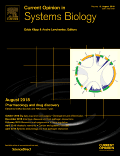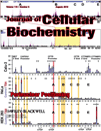
Current Opinion in Systems Biology
metrics 2024
Elevating research standards in applied mathematics and biochemistry.
Introduction
Current Opinion in Systems Biology is an esteemed academic journal published by ELSEVIER, focusing on the dynamic and interdisciplinary field of systems biology. Since its inception in 2017, the journal has made significant strides in disseminating cutting-edge research and innovative perspectives across various domains, including applied mathematics, biochemistry, and drug discovery. With an impressive impact factor reflecting its prominent position as a Q1 journal in multiple categories—including Applied Mathematics, Biochemistry, and Computer Science Applications—it serves as a vital resource for researchers, professionals, and students alike. The journal embraces a comprehensive approach to understanding complex biological systems, fostering a deeper insight into the interactions within biological and computational frameworks. This makes it an essential conduit for advancing knowledge and innovation in systems biology, facilitating the development of new methodologies that could lead to groundbreaking discoveries.
Metrics 2024
 1.68
1.68 3.40
3.40 -
- 34
34Metrics History
Rank 2024
Scopus
IF (Web Of Science)
JCI (Web Of Science)
Quartile History
Similar Journals

JOURNAL OF CELLULAR BIOCHEMISTRY
Delivering Impactful Findings in Biochemistry and Cell BiologyJournal of Cellular Biochemistry is a premier academic journal dedicated to advancing the field of biochemistry and cellular biology. Published by Wiley, this influential journal has a significant impact factor that underscores its relevance and authority within the scientific community. With its ISSN 0730-2312 and E-ISSN 1097-4644, the journal has been on the frontier of research since its inception in 1982, and is expected to continue publishing cutting-edge studies through 2024. As evidenced by its ranking in the 2023 Scopus Quartiles, it holds a rank of Q2 in Biochemistry and Q3 in both Cell and Molecular Biology, placing it among the top tiers of scientific journals in these disciplines. The Journal of Cellular Biochemistry serves as a vital resource for researchers, professionals, and students alike, providing a platform for the dissemination of innovative ideas and findings that shape our understanding of cellular processes and biochemical pathways. Though it does not currently offer Open Access options, its robust peer-review process ensures that each publication meets the highest academic standards, thus solidifying its esteemed position in the landscape of biochemical research.

Molecular Systems Biology
Driving Collaboration for Groundbreaking Biological AdvancesMolecular Systems Biology, published by SpringerNature, is a premier open access journal that has been a cornerstone in advancing the fields of biological science since its inception in 2005. With its ISSN 1744-4292, this journal exemplifies high scholarly standards, boasting an impressive suite of impact factors, including Q1 rankings across various disciplines such as Agricultural and Biological Sciences, Biochemistry, Genetics and Molecular Biology, and more, highlighting its significant contribution to the scientific community. The journal offers robust access options to facilitate innovative research dissemination, reaching a global audience while maintaining a commitment to fostering collaboration and dialogue among researchers, professionals, and students. With a focus on integrating quantitative approaches to biological systems, Molecular Systems Biology plays a vital role in addressing complex biological questions, paving the way for groundbreaking discoveries and advancements in healthcare, environmental sustainability, and functional genomics.

BIOCHEMICAL AND BIOPHYSICAL RESEARCH COMMUNICATIONS
Connecting researchers through groundbreaking discoveries.BIOCHEMICAL AND BIOPHYSICAL RESEARCH COMMUNICATIONS, published by Academic Press Inc Elsevier Science, stands as a leading periodical in the fields of biochemistry, biophysics, cell biology, and molecular biology. With an ISSN of 0006-291X and an E-ISSN of 1090-2104, this esteemed journal has been a pivotal platform for the dissemination of groundbreaking research since its inception in 1959, continuing to publish influential findings through at least 2024. It holds a commendable Q2 ranking in Biochemistry and Q1 status in Biophysics as of 2023, reflecting its high impact and relevance in the field, supported by its strong Scopus rankings—ranking #43 in Biophysics and maintaining a presence in the top quartiles of several related categories. Although it is not an open-access journal, it provides critical insights and essential data that cater to researchers, professionals, and students keen on advancing their understanding of complex biochemical and biophysical processes. Its significant contributions to the scientific community underscore the importance of this journal as a reference point for innovative research and collaborative discourse.

Cell Systems
Unraveling the Complexities of Cellular SystemsCell Systems is an esteemed journal published by CELL PRESS, dedicated to advancing the field of systems biology and its applications in cell biology, histology, and pathology. Since its inception in 2015, it has quickly ascended to a prominent position within the academic community, currently holding a Q1 ranking across multiple categories including Cell Biology, Histology, and Pathology and Forensic Medicine for 2023. With an impressive Scopus ranking—third in Medicine: Pathology and Forensic Medicine, and similarly high standing in Histology—it serves as a key resource for researchers and professionals aiming to explore and disseminate cutting-edge research findings. The journal provides an open-access platform, making it an accessible source of knowledge for students and scholars alike, fostering collaboration and innovation within the dynamic landscape of cellular research. With a commitment to high-quality and impactful publications, Cell Systems plays a pivotal role in shaping the future of biological sciences.

JOURNAL OF RECEPTORS AND SIGNAL TRANSDUCTION
Advancing the Frontiers of Receptor BiologyJOURNAL OF RECEPTORS AND SIGNAL TRANSDUCTION, published by TAYLOR & FRANCIS LTD, is a premier academic journal dedicated to advancing our understanding of receptor biology and signal transduction mechanisms. With an ISSN of 1079-9893 and an E-ISSN of 1532-4281, this journal has maintained a reputable standing since its inception in 1980, continually addressing pivotal topics in biochemistry, cell biology, and molecular biology. As evidenced by its 2023 Scopus rankings, which place it in the 64th percentile for Biochemistry and Genetics and Molecular Biology, JOURNAL OF RECEPTORS AND SIGNAL TRANSDUCTION remains a vital source for cutting-edge research, providing insights that are essential for both academic and practical applications. Although the journal currently offers limited open access options, it stands out in the Q2 and Q3 quartiles of its respective categories, making it an invaluable resource for researchers, professionals, and students aiming to stay abreast of the latest findings and methodologies in receptor and signaling research. The journal's commitment to disseminating high-quality research underscores its significance within the scientific community, fostering innovation and collaboration across disciplines.

NATURE STRUCTURAL & MOLECULAR BIOLOGY
Innovating the Landscape of Structural BiologyNATURE STRUCTURAL & MOLECULAR BIOLOGY is a leading journal published by NATURE PORTFOLIO, dedicated to advancing the field of molecular and structural biology since its inception in 1998. With an impressive impact factor that places it in the Q1 quartile across both the Molecular Biology and Structural Biology categories, this journal is pivotal for researchers and professionals seeking to publish innovative and high-impact results. Its Scopus ranking further highlights its elite status, with a remarkable 98th percentile for Structural Biology and 95th for Molecular Biology. While the journal does not currently offer open access, it continues to foster a rich discourse among scientists by providing a platform for the dissemination of groundbreaking research. Located in the United Kingdom and operated from Berlin, the journal's commitment to excellence positions it as an indispensable resource for students, researchers, and practitioners in the realms of biochemistry, genetics, and molecular biology.

KOREAN JOURNAL OF PHYSIOLOGY & PHARMACOLOGY
Advancing knowledge in physiology and pharmacology.Welcome to the Korean Journal of Physiology & Pharmacology, a pivotal academic platform dedicated to advancing the disciplines of physiology and pharmacology. Published by the esteemed Korean Journal of Physiology & Pharmacology, this journal has been disseminating valuable research findings since its inception in 1997 and continues to be a critical resource for researchers, professionals, and students in South Korea and beyond. With an ISSN of 1226-4512 and E-ISSN of 2093-3827, it offers insights into various aspects of drug action and physiological mechanisms. Although this journal currently does not subscribe to Open Access, it plays a vital role in bridging the gap between experimental and clinical studies, receiving commendations for its quality. In the 2023 Scopus rankings, it is notably positioned in the Q3 quartile for Pharmacology and Q4 for Physiology, reflecting its commitment to excellence. As the journal converges towards its comprehensive coverage in 2024, it remains a cornerstone for those looking to engage deeply with critical developments in these fields.

Protein & Cell
Fostering Global Knowledge Exchange in Biochemical ResearchProtein & Cell, published by Oxford University Press, is a distinguished international journal focusing on cutting-edge research in the fields of biochemistry, biotechnology, cell biology, and drug discovery. This open access journal, active since 2014, is dedicated to disseminating innovative findings that advance our understanding of protein functions and cellular processes, making it an essential resource for researchers, professionals, and students alike. With an impressive 2023 impact factor reflected in its Q1 ranking across multiple categories such as Biochemistry, Drug Discovery, and Cell Biology, 'Protein & Cell' stands at the forefront of scientific research, driving collaboration and discussion in the scientific community. Researchers can access the journal freely online, fostering a global exchange of knowledge and contributing to significant advancements in medicine and biotechnology. Located in the United Kingdom, the journal strives to be a pivotal platform for impactful research that influences future studies and applications.

TRENDS IN BIOCHEMICAL SCIENCES
Pioneering Insights for Tomorrow’s ResearchTRENDS IN BIOCHEMICAL SCIENCES is a premier academic journal published by CELL PRESS, focusing on the latest advancements and insights in the dynamic fields of biochemistry and molecular biology. With an ISSN of 0968-0004 and an E-ISSN of 1362-4326, this journal has established itself as a leading source of high-impact research, boasting an impressive Q1 category ranking in both Biochemistry and Molecular Biology as of 2023. The journal's Scopus Ranks further highlight its significance, placing it in the top 3% and 4% of its respective fields, emphasizing its role as a vital platform for disseminating innovative research. Published since 1976 and continuing through 2024, TRENDS IN BIOCHEMICAL SCIENCES provides a comprehensive overview of the latest trends, methods, and applications, helping researchers, professionals, and students stay at the forefront of their disciplines. Although it offers traditional access options, the journal's rich content and authoritative analysis make it a must-read for those pursuing cutting-edge biochemical research.

BIOCHIMICA ET BIOPHYSICA ACTA-GENERAL SUBJECTS
Driving Innovation in Biochemical and Biophysical StudiesBIOCHIMICA ET BIOPHYSICA ACTA-GENERAL SUBJECTS, published by Elsevier, serves as a pivotal journal in the fields of biochemistry and biophysics, with a long-standing history dating back to 1956. This esteemed publication, bearing the ISSN 0304-4165 and E-ISSN 1872-8006, continuously contributes to advancing our understanding of complex biological processes through rigorous research articles and reviews. It notably holds a distinguished position with a Q2 classification in Biochemistry and a Q1 ranking in Biophysics for 2023, reflecting its high relevance and impact within these scientific domains. The journal is also recognized within the Scopus metrics, taking a rank of #40 out of 152 in Biophysics and #173 out of 438 in Biochemistry, thus placing it in the 74th and 60th percentiles respectively. Academics and professionals in the life sciences will find this journal an essential resource for current research, cutting-edge techniques, and comprehensive reviews aimed at enhancing the understanding of biological functions. While BIOCHIMICA ET BIOPHYSICA ACTA is not an open-access journal, it remains a cornerstone publication for those seeking to stay at the forefront of biochemical and biophysical research.